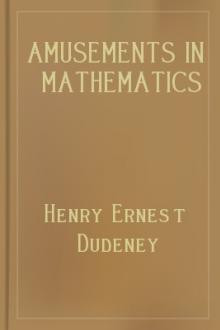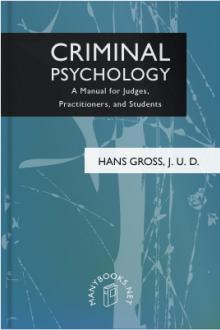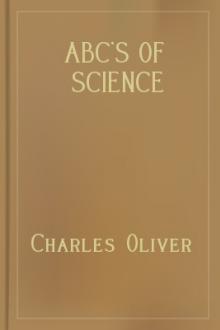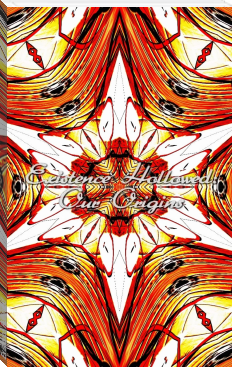Genre Science. Page - 8

bleby law? I came out this morning with a certain amount of money in mypocket, and I find I have spent just half of it. In fact, if you willbelieve me, I take home just as many shillings as I had pounds, and halfas many pounds as I had shillings. It is monstrous!'" Can you sayexactly how much money Jorkins had spent on those presents?
11.--THE CYCLISTS' FEAST.
'Twas last Bank Holiday, so I've been told,Some cyclists rode abroad in glorious weather.Resting at noon within a tavern old,They all agreed to have a feast together."Put it all in one bill, mine host," they said,"For every man an equal share will pay."The bill was promptly on the table laid,And four pounds was the reckoning that day.But, sad to state, when they prepared to square,'Twas found that two had sneaked outside and fled.So, for two shillings more than his due shareEach honest man who had remained was bled.They settled later with those rogues, no doubt.

heancients denominated destiny, nature, or providence, which wecall the voices of the dead, and whose power it is impossible tooverlook, although we ignore their essence. It would seem, attimes, as if there were latent forces in the inner being ofnations which serve to guide them. What, for instance, can bemore complicated, more logical, more marvellous than a language?Yet whence can this admirably organised production have arisen,except it be the outcome of the unconscious genius of crowds?The most learned academics, the most esteemed grammarians can dono more than note down the laws that govern languages; they wouldbe utterly incapable of creating them. Even with respect to theideas of great men are we certain that they are exclusively theoffspring of their brains? No doubt such ideas are alwayscreated by solitary minds, but is it not the genius of crowdsthat has furnished the thousands of grains of dust forming thesoil in which they have sprung up?
Crowds, doubtless, are always uncon

that differences of opinion arescarcely likely to arise as to its applicability in practice.
*** A refinement and modification of these views does not becomenecessary until we come to deal with the general theory of relativity,treated in the second part of this book.
SPACE AND TIME IN CLASSICAL MECHANICS
The purpose of mechanics is to describe how bodies change theirposition in space with "time." I should load my conscience with gravesins against the sacred spirit of lucidity were I to formulate theaims of mechanics in this way, without serious reflection and detailedexplanations. Let us proceed to disclose these sins.
It is not clear what is to be understood here by "position" and"space." I stand at the window of a railway carriage which istravelling uniformly, and drop a stone on the embankment, withoutthrowing it. Then, disregarding the influence of the air resistance, Isee the stone descend in a straight line. A pedestrian who observesthe misdeed from the footpath notices th

this truth opens up a vast field for re-examination. It means that we must study all the possible data that can be causes of crime,--the man's heredity, the man's physical and moral <p vii> make-up, his emotional temperament, the surroundings of his youth, his present home, and other conditions,--all the influencing circumstances. And it means that the effect of different methods of treatment, old or new, for different kinds of men and of causes, must be studied, experimented, and compared. Only in this way can accurate knowledge be reached, and new efficient measures be adopted.
All this has been going on in Europe for forty years past, and in limited fields in this country. All the branches of science that can help have been working,--anthropology, medicine, psychology, economics, sociology, philanthropy, penology. The law alone has abstained. The science of law is the one to be served by all this. But the public in general and the legal profession in particular have remained either ignorant of

unt of vapor for animals and vegetables to flourish.
5. Venus has the brightest lustre of our planets which is caused from enormous amount of vapor. It is carried over its orbit at about 67,000,000 miles from the sun, which requires 224 7/10 days to complete its course. Rotates once every 23 hours and 21 minutes. Diameter, 7,700 miles.
6. The earth is carried over its orbit; main distance being 93,000,000 miles from the sun, which requires one year to complete its course, which is 680,000,000 miles:
MILES Earth's diameter 8,000 Greater or equatorial 7,925 Less or polar 7,899 Difference on comparison 26
The earth rotates once every 23 hours, 56 minutes, and 4 seconds; has one satellite, which is carried over its orbit at a distance of 238,850 miles from the earth. Its diameter is 2,160 miles. The moon completes its orbit in 29 days, 12 hours, 44 minutes, and 2 seconds. Its currents touch the earth and cause the tide; also affects some plants of the phenomena verita; these plants are

. Nor have I been disappointed; in this and in all other perplexing cases I have invariably found that our knowledge, imperfect though it be, of variation under domestication, afforded the best and safest clue. I may venture to express my conviction of the high value of such studies, although they have been very commonly neglected by naturalists.
From these considerations, I shall devote the first chapter of this Abstract to Variation under Domestication. We shall thus see that a large amount of hereditary modification is at least possible, and, what is equally or more important, we shall see how great is the power of man in accumulating by his Selection successive slight variations. I will then pass on to the variability of species in a state of nature; but I shall, unfortunately, be compelled to treat this subject far too briefly, as it can be treated properly only by giving long catalogues of facts. We shall, however, be enabled to discuss what circumstances are most favourable to variation. In the

Due to the petroleum economic revolution in Arabian Gulf Countries in the last 50 years, this region has a unique and peculiar management structure for their national research and innovation system. This book adds a value as a contribution to analyze and discover a unique national R&D system from within, which is unlike any other national system in the West or the East. The book also propose several practical management solutions to improve and re-organize the research, development, and innovation (RDI) ecosystem. The author emphasize the role of innovation to build nations. In this brief book, the author spent over a decade to develop and shape his opinions regarding the RDI system. These concepts are presented in a readily accessible non-academic style for the reader so that it can appeal to a broad audience rather than a limited group of academics.

The ancient genius and one of a kind sage Pythagorus' cults not only counted with numbers, they worshipped them! Numbers, they proclaimed, are more than just arbitrary numerical symbols designating concepts which are cold, distant, and ambivalent to the fate of humans. Why, the numbers are humans themselves! Anthropological archetypes, anyway. The point is, numbers have a history. And the history of numbers begins with: The Twelve Moments, which is the title of the second of the two pieces contained herein. The first piece, Falling into the Past, is a mathematical treatise on the very nature of spacetime, and the inspiration for the proceeding parable.

The Meaning of Surah 99 Az-Zalzalah (The Earthquake) From Holy Quran Bilingual Edition In English and Spanish Languange.
Surah Al-Zalzalah (The Earthuake") is the 99th chapter (surah) of The Holy Qur'an, composed of 8 verses (ayat). Though it is usually classified as a Medinan surah, the period under which the surah was revealed is not unanimously agreed upon by Qur'anic exegetes.
The surah begins by describing how on the Day of Judgment, the Earth will give off a terrible earthquake and "throw up her burdens". Through the inspiration of God, the Earth will bear witness to the actions of men it has witnessed. According to Michael Sells, the earth opening up and bearing forth her secrets in this surah is indicative of a birth metaphor.
The earth al-'Ard in the feminine gender bears forth of how her lord revealed the final secret to her. Human beings will then realize that the moment of accountability has arrived. This meticulous accountability will reflect good and evil deeds that might have seemed insignificant at the time.
The two concluding verses state that all men will be sorted out into groups according to their deeds, and they will see the consequence of everything they have done; every atom's weight of good or evil:
That day mankind will issue forth in scattered groups to be shown their deeds.
And whoso doeth good an atom's weight will see it then,
And whoso doeth ill an atom's weight will see it then.
— The Holy Qur'an, verses 99:6-8 (translated by Marmaduke Pickthall)
Its theme is the second life after death and presentation in it before man of the full record of the deeds done by him in the world. In the first three sentences it has been told briefly how the second life after death will take place and how confounding it will be for man. In the next two sentences it has been said that this very earth on which man has lived and performed all kinds of deeds thoughtlessly, and about which he never could fancy that this lifeless thing would at some time in the future bear witness to his deeds, will speak out on that Day by Allah's command and will state in respect of each individual person what act he had committed at a particular time and place.
Then, it has been said that men on that Day, rising from their graves, will come out in their varied groups from all corners of the earth, to be shown their deeds and works, and their presentation of the deeds will be so complete and detailed that not an atom's weight of any good or evil act will be left unnoticed or hidden from his eyes.
